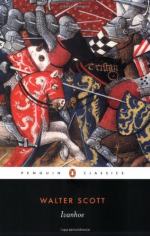|
|
Ivanhoe Chapter 1
In ancient England, there is a large forest that is the site of much history and the home to many rebels. This forest lies between Sheffield and Doncaster. The time of our story is near the end of the reign of Richard I in the twelfth century. The King has long been a prisoner in a foreign land, and in his absence his subjects were forced to live under an oppressive rule. The nobles, who had once exercised great power, began to do so again, increasing their wealth and property, and threatening the freedom of the lower classes. Hoping to gain more vassals, they put the franklins--free landowners not of the noble class--in a difficult and dangerous position. The franklins could find protection with a noble, but at the risk of losing the land and independence so important to the English people.
The Conquest by Duke William of Normandy in 1066 had worsened the class divide. The Normans had become the rulers of the once dominant Anglo-Saxons. After the battle of Hastings, the Saxons were forced from the land of their ancestors. Language became a form of oppression, as the Normans allowed only French for legal and royal proceedings, making French the language of the learned and heroic. The new ruling class did all in its power to subordinate the Anglo-Saxons and a rift grew between the classes, as:
"The royal policy had long been to weaken, by every means, legal or illegal, the strength of a part of the population which was justly considered as nourishing the most inveterate antipathy to their victor." Chapter 1, pg. 2
At sunset one day, two figures make their way through a dense forest. The older one wears a simple garment made of animal hide, whose rough texture increases the seemingly wild nature of this man. On his belt he carries several knives, and a ram's horn for blowing. He wears a brass ring around his neck. The swineherd's ring says: "Gurth, the son of Beowulph, is the born thrall of Cedric of Rotherwood." Chapter 1, pg. 5 The other figure is a younger man who wears brightly colored clothes, and a brass collar himself, which reads: "Wamba, the son of Witless, is the thrall of Cedric of Rotherwood." Chapter 1, pg. 5 His bell and cap mark him as a jester, belonging to a wealthy noble. The serf, Gurth, is a sad man, a dark contrast to his bright companion Wamba. They speak in Anglo-Saxon, a dialect which marks their low class.
Gurth calls for his dog Fangs, and begins to herd his swine. Gurth curses the Norman practice of declawing Saxon dogs, and the two men joke about the pleasantries of the Norman-French language. The best of everything goes to the Normans, and the two feel lucky that their Saxon owner Cedric has stood proud as a Saxon in these troubled times. They worry that a powerful Norman, Reginald Front-de-Boeuf is returning to their area. Wamba jokes about telling Front-de-Boeuf or Philip de Malvoisin about Gurth's disregard for the ruling class. At the sound of horses, the two men retreat.




